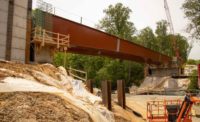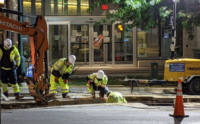Already behind schedule and over budget, Maryland’s Purple Line light rail project will need more time and more cash to reach the finish line, according to the Maryland Transit Administration.
Citing the challenges of completing utility work in the 16.3-mile project corridor’s “dense, urban environment” of Washington D.C.’s northern suburbs, “coupled with significant vehicular and pedestrian traffic,” the agency announced a 234-day delay that pushes the start of revenue service to winter 2027, five years later than originally planned.
The protracted utility work will also require the transit agency to provide up to $425 million in compensation to Purple Line Transit Partners, the private consortium overseeing the project under a 40-year design-build-operate-maintain concession. Payments will be made over five years upon achievement of certain project milestones, such as expected arrival of the first light rail vehicle in Maryland later this spring, completed major construction work on the University of Maryland College Park campus, reopening of a popular pedestrian-cycling trail along the route and start of systems testing.
The transit agency, which will submit in April its request for the schedule change and added funds to Maryland’s Board of Public Works, said Purple Line is now 65% complete, with nearly 17,000 linear feet of track in place and construction in progress at 13 of planned 21 stations.
The cost to design and build the line has nearly doubled from its original $2-billion estimate.
A joint venture led by U.S. subsidiaries of Dragados and OHL took over the half-finished project in 2022, following the acrimonious departure of the original Fluor-led team more than a year earlier, a move that also cost the state a $250 million to settle outstanding lawsuits. The transit agency oversaw a scaled-back construction effort until the consortium selected the new design-build team and achieved close on a restructured financing plan.
Fitch Ratings recently reaffirmed its BBB rating on the Purple Line’s $1.9-billion funding structure, but with a negative outlook due to “complex construction works” that forced two changes to the project schedule in as many years. Noting risks associated with rail projects in general and long remaining construction duration, Fitch said its project outlook may improve over the next 12 to 24 months should it "handle future delays in an expeditious manner that supports timely project completion and preserves the collaborative working relationship between all parties.”





